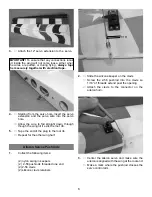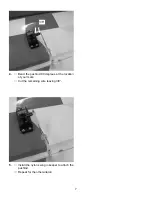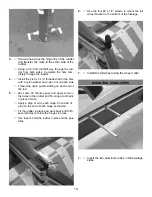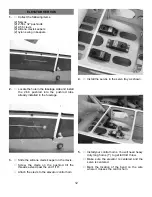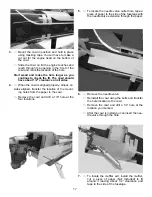
3
ADHESIVES & GLUING TECHNIQUES
CA adhesives are specially formulated to firmly glue the
plywood, hardwood, and balsa used in your model and to
withstand the vibration and stresses of high performance
flight. However, there are times, such as when you are
installing the stabilizer and fin on the fuselage and want
more set-up time for careful alignment and positioning,
then you should use epoxy. Occasionally, you also will
want to use thin CA, which "wicks" into the surrounding
areas. Aliphatic resin glue or similar water-based glues can
also be used, but they will add to the assembly time
because they dry so much more slowly than CA glue.
Remember, when ever using any CA, you must be careful
to read instructions thoroughly, as you will have only sec-
onds for positioning of parts. Be sure to trial fit parts
together before gluing. Also, never use watery THIN type
CA glue for gluing plywood and hardwood parts. Thin CA's
do not adequately bond these areas.
CAUTION
Some people may experience an allergic reaction when
exposed to fumes from CA glue or epoxy. As with paints,
thinners, and solvents, it is always important to use glues
only where there is adequate ventilation to carry fumes
away. A fan is recommended. Also, special care must be
taken when using CA, as it will bond skin as well as other
surfaces. Before using any CA, carefully read all label pre-
cautions. When using CA, protective eye-wear and care in
keeping the glue away from the face is highly recommend-
ed. If CA does happen to get into the eye, hold lid open
and flush with water only. Seek immediate medical atten-
tion.
CONSTRUCTION TIPS
IMPORTANT: ALWAYS READ A FEW STEPS AHEAD.
This will alert you to coming instructions and will help you
plan accordingly.
COVERING
The
67”Yak 54 ARF
is covered in a premium polyester
film chosen by many of the world's top flyers for its beau-
ty, toughness, and ease of application and repair. It is not
uncommon for ARF's to develop a few wrinkles in transit.
If this is true of your model, the situation is easily correct-
ed. Before you begin putting the pieces together, run
around the edge of the seams first then over the surface
of each section with an iron (either specially designed for
airplane use or the more cumbersome household iron).
Apply the heat (set at about 350° F), following along with
a soft cloth and pressing down on the covering as you go
around. This will more firmly set the covering adhesive
into the wood and keep your aircraft covering tight and
smooth in the future. Once you have ironed the seams
stay away from them with the heat or the covering will
slide when you try to shrink the middle. If this happens the
wrinkles will not come out of the covering.
ITEMS NEEDED TO COMPLETE THIS AIRCRAFT
1 24” FUEL LINE
1 ENGINE .90 TO 1.20 4-STROKE.
1 RADIO GUIDANCE SYSTEM
2
12”
AILERON SERVO EXTENSION WIRES
2
Y-HARNESS
1 CA ACCELERATOR
1 2 OZ. BOTTLE CA MEDIUM GLUE
1 1/2 OZ. BOTTLE CA THIN GLUE
1 30 MINUET EPOXY
1 1/2” FOAM RUBBER
1 3” SPINNER
OPTIONAL:
1
PILOT FIGURE
8 SERVO ARM EXTENSIONS
NOTE: The 67”Yak 54 ARF covering closely
matches Ultracote:
#872 Bright Yellow
#874 Black
#885 Midnight Blue
#866 True Red
#870 White






